Drama and Film
Explore your passion for the visual and performing arts on our joint honours degree in Drama and Film.
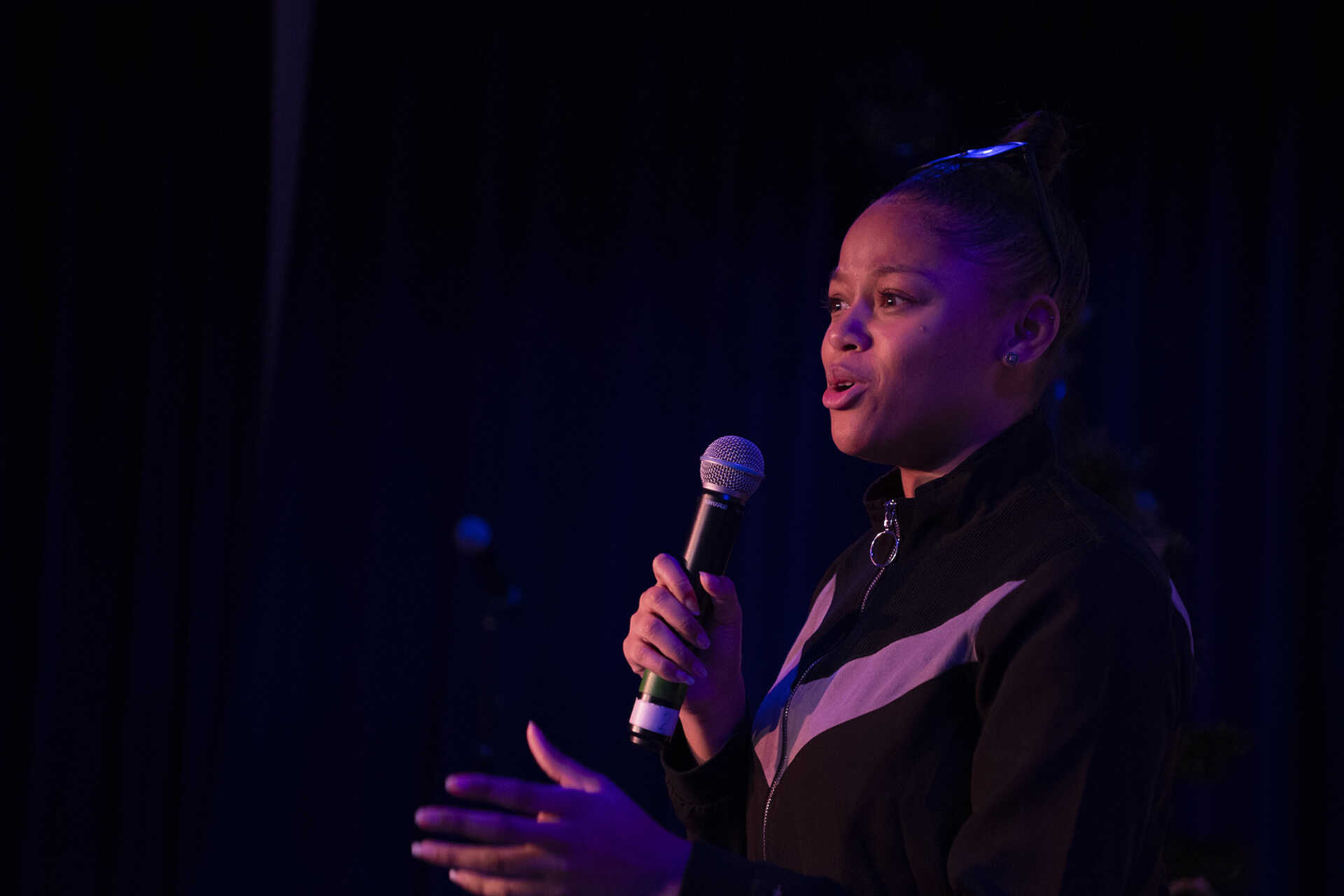
Explore your passion for the visual and performing arts on our joint honours degree in Drama and Film.
By studying Drama and Film, you'll benefit from exceptional teaching and industry links that will help you to launch your career. Covering a wide range of subjects and developing your practical skills as well as critical thinking, this dynamic course allows you to explore your own style and creativity and follow your passions and ambitions in the visual and performing arts.
We'll challenge you with theoretical and practical study, empowering you to shape your degree around your areas of interest. From acting to directing, screenwriting to documentary filmmaking, world cinema to popular performance and many more, you'll explore your subjects alongside fellow students, creating new work and discovering new ways of seeing established works. Our team of academics, professional practitioners and technical specialists will support you every step of the way as you analyse, create and critique, developing your understanding of drama and film, becoming a more confident performer and maker.
You'll study within an exciting and diverse environment, benefitting from our strong connections with industry and local arts venues, opportunities for workplace learning and our flagship Graduate Theatre Company scheme, all of which support you in kick-starting your career within the creative industries.
You can take this degree with a year of working or studying abroad.
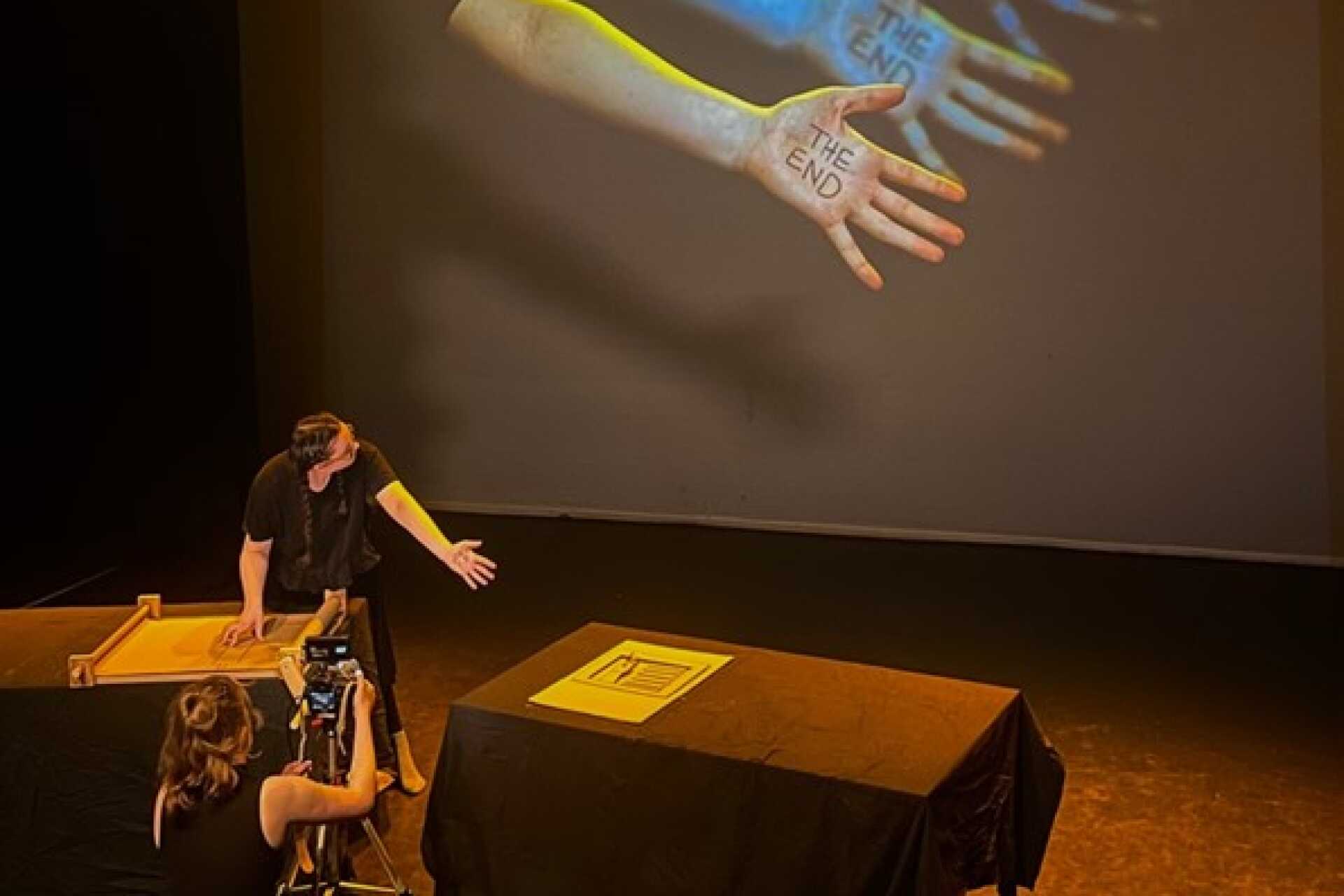
From physical theatre to editing, stand-up comedy to community arts, acting to directing, follow a passion or find a new one to develop as an artist.
Film at Kent was ranked 8th in The Guardian University Guide 2024.
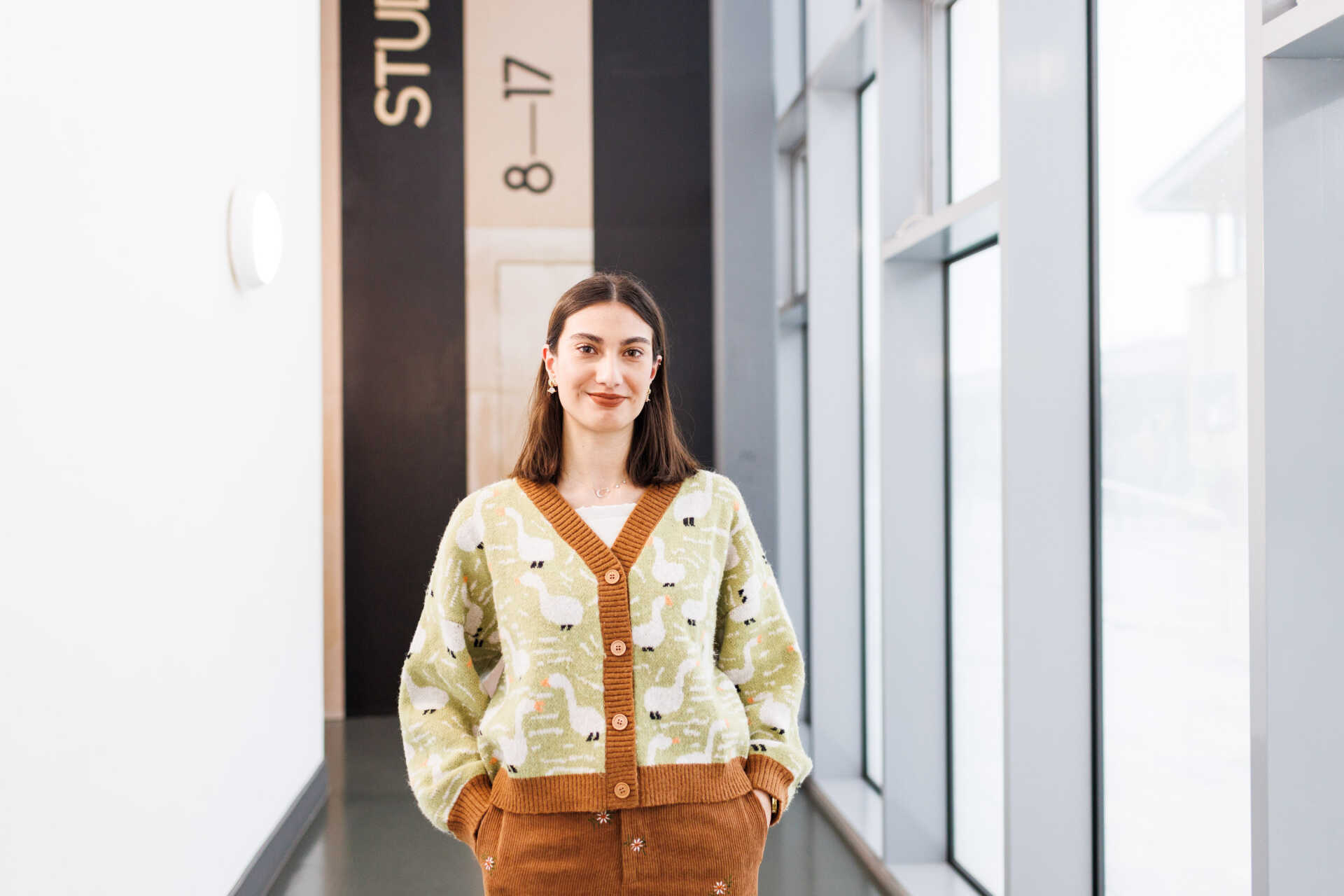
Three years after graduating, Amelia Mundy has already managed to land her ‘dream job’ in TV production. So how did she manage it?
Links with industry and local arts venues and our flagship Graduate Theatre Company scheme help to kick-start your career in the creative industries.
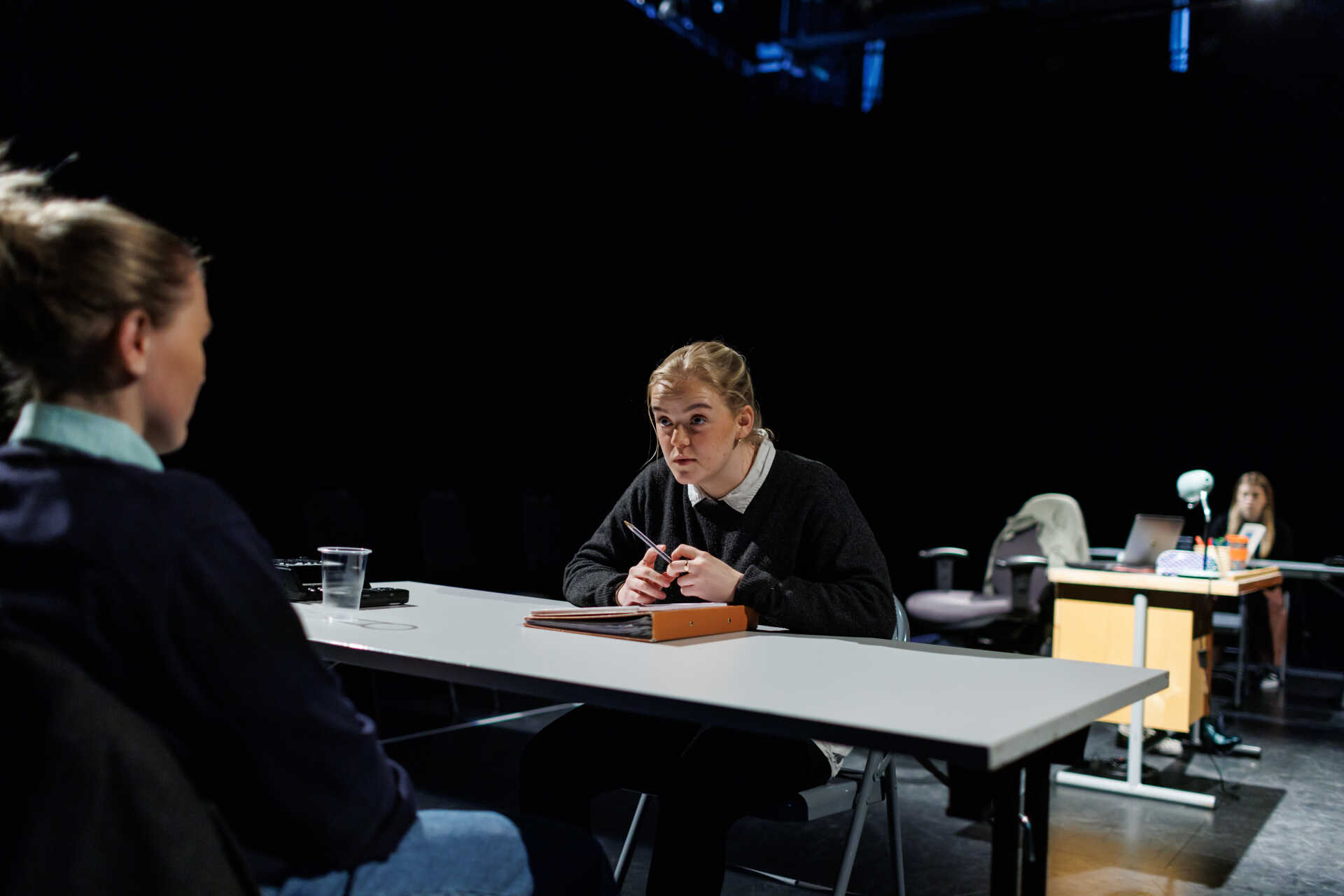
From rehearsal studios to theatres and a green screen studio, our bespoke facilities will improve your practical skills and technical knowledge.
Our typical offer levels are listed below and include indicative contextual offers. If you hold alternative qualifications just get in touch and we'll be glad to discuss these with you.
BBB
The University will consider applicants holding BTEC National Diploma and Extended National Diploma Qualifications (QCF; NQF; OCR) on a case-by-case basis. Please contact us for further advice on your individual circumstances. A typical offer would be to achieve DMM.
120 tariff points - typically H5 H6 H6 or equivalent.
Pass the University of Kent International Foundation Programme.
The University will consider applicants holding T level qualifications in subjects closely aligned to the course.
Obtain Access to Higher Education Diploma with 45 credits at Level 3 with 24 credits at Distinction and 21 credits at Merit.
The following modules are what students typically study, but this may change year to year in response to new developments and innovations.
Get ready to challenge yourself and be challenged, as you get to know the raw ingredients of contemporary performance.
In this first of three Making Performance modules, you’ll experiment with space, text, physical acting and ensemble devising. You’ll encounter important practitioners and groundbreaking performances, while also gaining hands-on experience in the foundations of lighting, sound and stagecraft.
The skills you’ll develop through your first performances this term, along with introductions to key concepts and practitioners, will provide a foundation for the rest of your studies and your career in the arts.
Have you ever wanted to better understand film as a media form and learn how to make your own? Film and Media Practice 1 draws on concepts in film and media studies to introduce you to moving image production and the principles of audiovisual language.
You’ll learn technical skills in pre-production, production and post-production along with skills applicable to both narrative and experimental screen production. Through a combination of lectures, screenings, creative and technical workshops, and peer reviews of work in progress, this module encourages experimentation, critical reflection, independent thought, and dialogue between theory and practice.
Effective group work is integral to your success in this module. Practical work is designed to trigger both conceptual and creative thinking, and to encourage you to consider audience responses to audiovisual language, making rapid progress in your ability as a filmmaker.
Are you passionate about plays? Do you want to learn more about their history, and become confident understanding a variety of play texts?
In this module, you’ll explore a range of performance texts, from Ancient Greece to the 21st century. Weekly lectures will ground your understanding contextually, and practical workshops will enable you to bring the scripts to life with embodied understanding.
This contextual understanding will culminate in two assessments: a historical essay and an in-class presentation. This module (together with Making Performance 1 and 3) will give you a solid foundation for the rest of your degree and for a career in performance.
What is film? What sort of questions do academics discuss in relation to this medium? You’ll engage in the systematic exploration of film offered by film theory, including competing definitions of film and discussions around what characterises the medium, how spectators engage with film, and the social, cultural, and political conditions and ideologies that film reproduces.
You’ll discuss classical and contemporary writings on film, and develop your own arguments on exemplary films to learn how each theoretical approach offers a valuable set of tools for analysing film. You’ll understand the major debates in relation to the medium, and be able to discuss these productively.
This exploration of film theory is critical to your development in the field. Whether you want to find your voice as a critic, or your vision as a filmmaker, this module is a key step in getting there.
Why is editing a core element of the filmmaking process? Through hands-on work combining creative exercises and close analysis of films, you’ll explore how combining images can fulfil various functions including shaping stories, guiding points of view, creating emotions and aesthetic effects, and generating meaning.
As well as focussing specifically on the work carried out by film/video editors, you’ll also engage with ‘editing’ as an approach to shaping raw material that extends across all aspects of film production, from screenwriting to directing and post-production. The module will situate this focus within the broader context of ‘montage’ and ‘collage’ as principles that extend across diverse art forms, including painting, sculpture, photography, literature, music, and digital media.
A series of practical exercises will enable you to focus on the editing choices made in various fiction, documentary, experimental, found footage, and interactive films. Giving you the chance to get hands on and develop your own editing style.
Have you got what it takes to write a film? This module offers you an introduction to the concepts, terms, and skills involved in writing screenplays and to the craft of screenwriting. Screenwriting is a unique form of writing with very different concerns from novels, theatre and radio. Although the screenplay is a vital component of a film’s success, it tends to be neglected as an art form in of itself.
In this module, you’ll explore the conventions of dramatic structure, and examine new narrative forms and short film variations. We’ll encourage you to think critically about screenwriting and you’ll have the opportunity to write your own screenplay.
We’ll take you through the writing process using a series of creative exercises, from preparation and initial concept to the final draft of a script. By the end of the module, you’ll have gained practical knowledge and have started to develop your own creative voice - and of course, a screenplay of your own.
Developments in online streaming, film festivals and technical innovation have seen an unprecedented expansion in documentary filmmaking. Through practical exercises and analysis of film texts, this module will introduce you to the essential components of non-fiction filmmaking.
You’ll take part in practical projects and also learn through lectures and screenings, which draw on a range of film texts and look at examples from the history of non-fiction film such as early cinema, direct cinema, cinema verité, and the film essay. The exercises provide opportunities for you to develop your creative practice, including the development of a treatment/proposal leading to the production of a final film project.
By the end of the module, you’ll understand how theory and critical analysis can develop your understanding of – and practical skills in – documentary filmmaking.
Pursuing a career in the arts not only requires creativity and talent but also an understanding of how the UK arts sector operates. In this module, you’ll learn about all aspects of the creative industries and the various career paths that exist for arts graduates.
Through tasks and exercises, you’ll develop both practical and critical skills, ranging from writing CVs and funding applications to managing your professional portfolio and using social media and networking to boost your career prospects and promote your work.
The module will also help you to consider and reflect on which types of creative careers align with your ambitions, and to develop a plan for pursuing your chosen path. As well as giving you the tools to bring your plan to life and achieve you goals.
While American and European films have dominated film production and exhibition, cinema is a global phenomenon. In this module, you’ll study the historical, cultural, political and economic determinants of ‘world’ or ‘national’ cinemas and consider their influence within domestic and international contexts. You’ll look at case studies from various regions of the world including Latin America, Scandinavia, Eastern Europe, and East Asia.
The module will explore how filmmakers actively franchise, adopt, and rework film styles and genres. You’ll examine how filmmakers respond to the culture and local history of different countries, and to international influences. You’ll also explore colonial and postcolonial politics and culture. You’ll consider how filmmakers tailor their practice to the tastes and demands of local and foreign audiences and investigate the funding structures, distribution strategies and industrial structures that incentivise certain topics and representation styles.
You’ll critically assess how cinema reflects on notions of national identity, as well as gender, sexual, and racial identity. Alongside this, you’ll explore the place of marginalised and migrant communities in national identity and culture. This gives you great intercultural awareness and understanding, helping you produce films as a global citizen and speak to a wider range of audiences with your work.
What makes a good actor? Instinct? Imagination? Skills?
Explore the theory and practice of Naturalism through key plays of the 20th and 21st centuries, comparing different leading practitioners and culminating in performance.
You’ll study acting techniques developed by Stanislavski and his successors and learn the basic terms and concepts of mainstream rehearsal-room practice, including Uniting, Actions and Activities, Objectives, Obstacles, Stakes, and Given Circumstances.
You’ll analyse play texts from the practical point of view of an actor, working on plays from 1930 to the present, researching their original context (cultural, political and dramaturgical) and consider how they might be played today.
You’ll perform play extracts in class for feedback, produce a portfolio (a short written analysis and a reflective account of your process) and take part in a final performance. Even if you don’t want to become an actor, you will emerge with transferrable skills of the confidence to speak directly to an audience, experience in working collaboratively towards a deadline and problem-solving and trouble-shooting skills.
Musical theatre dance is a melting pot of African, Indian, Caribbean, and Afro-Latin movement, influenced by ballet, modern, and social dance. You’ll learn about this history and the key developers of musical theatre and jazz by dancing, as well as by analysing musicals across the 20th century. You’ll finish the module with improved dance technique and the ability to learn and perform choreography from different periods, along with a greater understanding of musical theatre and jazz dance’s multicultural history.
Want to develop your skills in popular performance and become a more versatile performer? Want to find out about the origins of much of today’s live entertainment industry, by learning about the politically radical DIY performance scene of Alternative Cabaret?
In this module, weekly workshops will introduce you to a range of performance skills including music making, performance poetry, stand-up comedy, sketch comedy and speciality acts, all of which involve learning how to address an audience directly and manipulate their responses.
You will also learn about 1980s Alternative Cabaret, using primary historical sources in the British Stand-Up Comedy Archive for a research essay. You will regularly devise and perform your own acts, inspired by historical examples from Alternative Cabaret, and the module culminates in a cabaret performed to a live audience in a public venue.
You will emerge with an enhanced confidence in your ability to engage and hold an audience, whether in a theatre, comedy club, classroom or the wider workplace.
What do Matilda, The Curious Case of the Dog in the Night-Time and Noughts & Crosses have in common? You guessed it: they are all book sources of highly successful stage adaptations. Theatre-makers continue to reinvent canonical stories – such as Romeo and Juliet, the Mahabharata and 1001 Nights – into new plays, musicals, puppetry shows and pantomime, while audiences flock to see them. Why, you might ask, are adaptations so popular nowadays? And how exactly do artists create them?
By taking this module, you will gain knowledge of the foundational building blocks of storytelling, and you will understand how these can be rearranged into new shapes. In our lectures and seminars, we will consider examples of how character, story structure, language, culture, medium, genre and ideology can evolve from one version to another. In our workshops, we will experiment with adaptation shifts in practice. We will also pay particular attention to the representation of race, gender and/or disability.
You will devise a practical adaptation based on a well-known source of your choice. You will also review adaptation techniques by discussing a case study. This module will equip you with the cultural competences, critical awareness and creative toolbox that will make you highly employable in any creative field.
“A good costume, like a good symbol, should conceal as much as it reveals”. We will explore this quote from Aby Warburg through an interdisciplinary approach to the study of costume and fashion – the art that can be worn – to explore its roles in drama, film and the visual arts.
The social values encoded by clothes, their relation to class or sexual identity, will be discussed, along with how these assumptions inform the use of costume in adaptations or stagings of texts, or how they colour our view of a character, or of a director’s interpretation (for example, using deliberate anachronism).
The role of clothing and costume in the history of art will be analysed from artists’ representation of clothes, contemporary or otherwise, to their involvement in fashion design, giving you both a broad overview and deeper understanding of fashion within the arts.
How can cinemas, galleries, theatres and museums become more accessible to visitors with impairments? How is disability understood and represented in contemporary culture?
By visiting and engaging with a range of arts institutions you will identify both barriers to inclusion and how they can be removed. You will critically assess the way in which institutions respond to their context, including relevant anti-discrimination law and the history of disability. You will conduct an access audit and review of a venue, gaining valuable training for anyone looking to work as an access officer in an arts, education or heritage context, or who wants to run events that are as accessible as possible.
Beyond this, you’ll be able to apply knowledge of accessibility and the history of disability rights and legislation to a range of work in the arts and heritage, education, community or charity sectors.
There isn’t just one way to approaches theatre and performance design. You’ll explore different styles and methods used to design theatre, while gaining hands-on experience of how to bring a performance to life using the elements of lighting, sound, and scenography.
Through lectures you will learn key design principles and how to interpret a performance text from a design point of view, while practical workshops will teach you the fundamentals of handling equipment effectively and safely, and how to realise design ideas within budget. By the end of the module, you will have developed your own design in collaboration with others and produce a design portfolio to demonstrate your work.
You will come away from this module with key fundamental skills in theatre design and tech, that will empower you to think more boldly about design and competently consider all key aspects of a production. This knowledge will serve you well whether you go on to create solo performance, tour your work as a company, or work in any industry that involves live events.
How do you go about writing a play or text for performance? What writers and playwrights inspire you? And how can you learn from their approaches to help you find your own writing style?
You will consider and answer these questions, as you develop your skills in writing and your own creative approach. You will have the opportunity to look at a range of performance texts and learn how to closely analyse these, to help you understand the fundamentals of writing for performance.
You will develop your skills by writing your own material and experience the results and effects of your writing by witnessing how it comes to life when it is performed by others. Through ongoing practise, discussion and constructive criticism from peers and lecturers, you will also develop an understanding of how important revision, editing and feedback are to the evolution of a piece of writing for performance.
By the end of the module you will have developed your ability to recognise and discuss what makes a good piece of writing, produce compelling performance texts of your own, and apply your skills as a confident and creative communicator.
Do you want to explore diverse schools, techniques, and methods of cinematography, from classical to contemporary approaches?
Through a blend of theoretical studies and practical exercises and assessments, you will analyse the role of cinematography in shaping narrative, mood, and audience perception. Hands-on experiences allow you to apply learned concepts while honing your technical skills behind the camera. From framing and lighting to camera movement and frame composition, you will gain a comprehensive understanding of the visual language of film and cinema.
You will emerge with a refined ability to craft compelling visual narratives and a deeper understanding of the integral role of cinematography in filmmaking.
Cinema has typically been regarded as a visual phenomenon – films, it is often said, are essentially moving pictures. Sound has, nevertheless, played an important role from the beginnings of cinema, a fact which has been acknowledged in the detailed historical, theoretical, and critical work on film music, and film sound more generally, produced over the past quarter-century.
Sound, Music, and Cinema will provide an overview of this field of research and provide you with a clearer understanding of, and greater sensitivity to, the soundtrack. You will be given an introductory framework for understanding sound, which may include topics such as the relationship between music and other aspects of film sound (speech, ambient sound, sound effects), as well as the nature of the relationship between sound and image.
Subsequent sessions will consider topics such as: the evolution of sound technology and its impact on the aural aesthetics of film; the use of classical and popular music in film scores; the emergence of the ‘sound designer’ in contemporary cinema; and the distinctive and innovative use of sound and music by a range of cinematic 'sound stylists'.
The year in industry takes place between your second and final year. It is a great opportunity to gain workplace experience, increase your professional contacts and acquire new skills, and is a valuable addition to your CV.
You can take the year in industry in the UK or abroad with a wide range of employers in areas including the arts, education and cultural heritage. While you are responsible for finding your placement, we offer support and guidance through the application process.
Tuition fees for the placement year are greatly reduced and employers may offer expenses or a salary.
The year in industry is assessed on a pass/fail basis and does not count towards your final degree classification.
What could you do in a year?My year in industry couldn’t have gone better. I secured a role at IBM, working in their sports and entertainment department – it was perfect for meTom Tillin Find out more
Going abroad as part of your degree is an amazing experience and a chance to develop personally, academically and professionally. You experience a different culture, gain a new academic perspective, establish international contacts and enhance your employability.
All students within the Faculty of Humanities can apply to spend a term or year abroad as part of their degree at one of our partner universities in North America, Asia or Europe. You are expected to adhere to any progression requirements including achieving a merit at Stage 1 and Stage 2 to proceed to the term or year abroad.
The term or year abroad is assessed on a pass/fail basis and does not count towards your final degree classification. Places and destination are subject to availability, language and degree programme. To find out more, please see Go Abroad.
Where could you go in a year?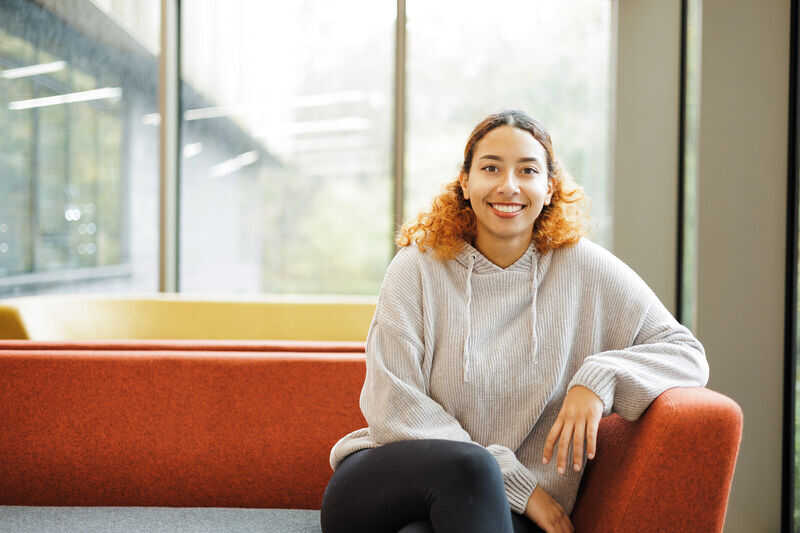
My ‘You only live once’ decision to study in Japan is one of the best I’ve ever made. I had a fantastic year.Cheyenne Nolan Find out more
You will take one of the modules 'creative project' or 'dissertation'. You will then choose 4 of the optional modules
Do you feel inspired to create an original performance, in a form and style of your choice? Are you ready to apply the skills you have built across your degree to create your final show for a public festival?
This module will give you the skills to initiate and carry out an independent project, working either as a soloist or in a small student company where you choose your own collaborators. You’ll take responsibility for devising an initial idea and bringing it to life by working with your classmates, lecturers and technical team. You’ll produce a high-quality piece of performance within real-world budget and resource limitations while applying safe and ethical working methods. You’ll gain project design and management skills that are essential for careers in the creative industries.
By applying the skills and knowledge that you have gained across your degree in a challenging, fully autonomous project, you’ll be taking the final step before entering the industry as a professional independent theatre maker.
Have you developed a passion for a particular topic in drama, film or media? Do you love writing, researching, and exploring a subject deeply? This is your chance to develop your skills and create a piece of work about the topics you are passionate about.
You’ll develop an in-depth independent investigation into a specific issue, guided by research questions, and establishing a dialogue with existing scholarship, practices and debates. You’ll start by conceptualising your project and work with an assigned supervisor. You’ll present your work in progress to get feedback from your peers in spring, and your final piece will be due in summer.
By building on what you’ve learnt during throughout your degree, you’ll create a new piece of research that will allow you to pursue your interests and ideas, honing your independent critical thinking skills and further expanding your employability.
Throughout its history, film has functioned as a powerful sociopolitical force. Individuals and groups have used this medium to express their identities (whether gender, sexual, ethnic, class, political, national etc.) to various audiences, to portray their histories and current realities, to interrogate social norms, to agitate for civil rights, and to imagine more equal futures.
Film's unique capacity to reflect, refract and represent has also meant that individuals and groups have also used it to exert power or subjugate, create and reinforce stereotypes about 'the Other' or justify their own dominance in the social order.
This module focuses on this vital aspect of cinema. You’ll focus on different case studies to enable you to critically reflect on how film feeds into and explores identities, and the political implications of this. Recognition of the ways film can be used for suppression or liberation helps you become a better, more ethical and impactful filmmaker.
Do you love movement? Are you fascinated by performance that sits in the crossover between theatre and dance? Are you keen to sharpen your devising skills and create captivating ensemble performance?
Explore the world of physical theatre and key practitioners who influenced its development over the last century. Through intensive workshops, practice-lectures, a reflective learning portfolio and a public performance, you’ll develop your understanding of movement as a communicator of meaning. You’ll explore how material is organised to make meaning, how texts are adapted through physical work, how we can move from experimentation and improvisation to clear form and structure. We’ll give you essential strategies for creative collaboration, including directing without dominating by giving feedback in a way that generates new possibilities, developing individual creative agency while working as part of a group and thinking about wellbeing in the creative process.
You’ll be encouraged to develop your own creative language and style so you don’t need to have any prior experience in movement techniques. You’ll become a more confident physical performer and maker, with key transferable skills in presenting, collaboration and creative wellbeing.
Have you ever wanted to direct a play? When you take this module you’ll explore the art of directing in a supportive pre-professional environment.
What does a director do? Is the director’s job to ascertain what the playwright meant and to clearly convey that to the audience? Or is the director a co-author of a performance whose intentions also inform the meaning of the work? These are fundamental questions that you’ll consider as you develop your directing skills, as you figure out what kind of director you want to be.
You’ll study a range of political and philosophical plays, which will be contextualised by a series of lectures, and through a series of workshops you’ll be introduced to techniques to translate the ideas from page to stage. In doing so, you’ll develop confidence in dealing with challenging concepts and using that understanding to inform the practical work. Even if you don’t want to become a director, these skills are transferable to several careers including teaching, PR, and marketing.
How can I make an audience laugh? How do comedians write, hone and deliver their material? What makes a joke funny? Does it matter what comedians say, and what we laugh at?
You’ll write and perform your own stand-up sets, before selecting one to perform in a public gig at the end of term. Whether you’re a complete beginner performing stand-up for the first time, or a more experienced comedian developing your act and improving understanding of your craft, you’ll learn to create artistically ambitious stand-up comedy that understands and responds to its social context. By acting as a director for your classmates and learning to analyse professional comedians’ work, you’ll gain the ability to reflect critically upon your own and others’ performances.
You’ll gain skills needed for a range of careers in the comedy industry including performing, directing, organising and managing stand-up, as well as skills that are vital for many careers. You’ll emerge as a highly capable public speaker who can write and deliver engaging material, using a sophisticated range of verbal tools to deliver your message with clarity.
How does art impact us the way that it does? And how do interdisciplinary researchers use the impact of art to improve people’s lives?
You will explore these questions through investigating theoretical ideas and research on the ways art is created, perceived, and applied. By studying empirical research on visual arts (painting, architecture, popular art), performing arts (dance and theatre), music, and film, you will gain knowledge about aesthetic perception, emotion and meaning in art, creativity, social and cultural influences on art, and the practices and ramifications of arts-sciences research.
By exploring a subfield of the arts and sciences of your choice, you’ll develop interdisciplinary literacy that has a wide range of applications beyond the module while also being able to follow your passions and carve out a niche. The primary focus will be on Western art forms, though other world art traditions and aesthetics will also be discussed.
Keen to gain practical experience in a professional industry setting? Thinking about how to start building professional networks beyond university? Interested in using self-reflection in practical ways towards building your future career? Then this module is the right choice for you.
As your first step towards your future career, you’ll engage in a placement/internship that will be relevant to your subject of study or ambitions. In addition to your placement, you will learn about employability in the creative arts industries and enhance your commercial awareness of what is needed to launch a career in this area.
You will be supported in learning how to approach prospective employers, tailor CVs, evaluate job descriptions, and promote yourself in a professional context, preparing you for life after university. You will also explore the value of your work placement experience through reflection and critical analysis.
Does the idea of working with different community groups inspire you? Do you want to extend your skills in workshop facilitation? Can you imagine running your own theatre company with an outreach remit?
By researching and considering participatory theatre in its various forms, and the historical and social context in which it developed, you will explore several case studies and critically analyse the different creative approaches used by practitioners in their specific work. Inspired by what you discover, you will practically explore different workshop and facilitation techniques and engage with current debates surrounding the efficacy of this type of theatre.
You will apply this knowledge to your own developing practice. Working as a member of a pre-professional company you will, with others in your group, negotiate the planning, facilitation and management of a community project working with a group of participants in a participatory theatre context.
You will emerge from this module with a highly desirable set of transferable skills, including the ability to be flexible and think on your feet in complex circumstances, to prepare inclusive and accessible spaces and activities, and to communicate confidently and sensitively with a range of audiences.
Why are so many films and television programmes adapted from other sources? Why do such adaptations frequently evoke powerful responses from viewers and critics? What role does screenwriting play in the adaptation process?
You will consider these questions as you explore the popularity of adaptations within popular culture. The module will provide the close study of screen adaptations taken from a variety of media which may include theatre, classic novels, short stories and comics. In doing so, you will engage with key topics from adaptation studies, considering the connections and differences between distinct media, focusing on key features such as the manipulation of time and space, characterisation, point of view, style, voice, interpretation and /or evaluation.
You will be encouraged to consider adaptation within an industrial context and the creative and practical implications of adapting works for the screen. You’ll have the opportunity to develop your own creative interests within adaptation studies in conjunction with a deeper understanding of the key theoretical concepts underpinning the discipline.
The digital age brought significant changes to the practice of film criticism. What are the challenges that critics face today, and how has in transformed over the years?
By exploring the history of this practice and reflecting on its present reality, you will apply your understanding of historical approaches to your own reviewing practice and learn how to pitch your reviews to different publications. You’ll get hands-on, regularly writing reviews and offering feedback on those of your peers. This will equip you to develop a constant flow of production, regularly revising your writing according to the learning you acquire every week.
You will critically reflect on your own practice, learn how to be constructive and collegiate, and develop skills such as time management, problem solving, and finding your own critical voice.
Why do audiences flock to certain films? How do you raise awareness of a particular film and encourage them to see it? What kind of strategies are best suited to promoting different types of film? These are the kind of questions faced by people working in film marketing and distribution – key figures in the industry and just as important as the content producers (filmmakers, actors) whose work they promote.
You will learn how marketing is used to mitigate risk and maximise revenue; what forms and formats film publicity takes and the purpose they serve; how distributors purchase rights and assemble lists; how distributors and marketers position individual films to certain target audiences and territories; how film audiences select which films to view; how cinematic exhibition fits within multi-platform distribution strategies and the rise of ‘non-traditional’ distribution portals (e.g. Netflix and Amazon).
You will also learn how to market a film and gain hands-on, practical experience of creating your own marketing materials, this gives you a greater understanding of the whole process of marketing and distribution, a key skill when breaking into the industry.
If you find yourself full of ideas for film, but short on budget, you aren’t alone. Most filmmakers begin their careers from the same position. So, learning how to make a small budget have a bigger impact is vital to establishing yourself as a filmmaker.
You will engage with key aspects of microbudget filmmaking through technical exercises and the creation of your own film. A series of practical projects will be contextualised through lectures drawing on several films, looking at examples from the history of extremely low budget genres such as horror, crime, independent and experimental films.
Through this work, you will be able to use theoretical ideas and critical analysis to develop creative projects and understand how to conceptualise, create and refine microbudget films. You will refine your creative practice in relation to industry practices and standards, building on the skills acquired previously on the course.
What is screen space? Would you like to be introduced to the professional careers and practical applications of film and television space in the industry, including location scouting, shooting and production design?
Screen Space and Location Scouting investigates films and/or television series shot on location and the staging of real spaces in studio. With a focus on cityscapes and rural landscapes, you’ll look at both topographically accurate uses of specific spaces and at creative geographies where cities, towns and streets are made to 'play' the role of other places.
This module also introduces you to mapping spatial film data (e.g., using software such as geographic information system, QGIS). You’ll produce an academic analysis of film space as well as getting hands-on with a practice-based component focussing on real-world processes of location scouting.
Cult films, animated worlds, film festivals, cinematic cities, the gothic on screen… there is now a wealth of specialist areas to explore within film studies.
Follow your passions and take a deep dive into one such area. Guided by the expertise of our academics, you will gain systematic knowledge of one specialist subject area for the duration of the module.
You will engage with key scholarship, rigorously interrogating the core ideas developed within the subfield and the debates that have ensued. Note: the specialist area varies from year to year according to the convenor’s area of expertise. (For the year's specific topic, please get in touch with the module convenor.)
Factual entertainment - one of the most widely consumed formats of television, film, podcast and other media - delivers non-fiction or unscripted scenarios in accessible, popular forms.
This is your opportunity to plan and produce an exemplary creative work. You’ll also gain an overview of the genre’s development and its links to documentary filmmaking through several case studies.
Each week’s topic will focus either on an aspect of production or in-depth discussion of a specific sub-genre of factual entertainment, which may include true-crime, reality TV, talent shows, lifestyle series or science and nature documentaries. Through this exploration, you’ll enhance your ability to critically reflect on debates over ethics, objectivity, the media maker’s role and/or audience manipulation.
Through exercises and presentation of ideas, you will engage with key practical considerations of making factual entertainment, which may include proposal-writing and pitching, using found/archival footage, collaborating with production companies, and analysing the implications (e.g. political, ethical) of their production decisions.
All modules involve lectures, small group seminars and film screenings (where relevant). Depending on the modules you select, assessment varies from 100% coursework (extended essays or dissertation), to a combination of examination and coursework.
Teaching is through workshops, seminars, lectures and practical projects. Drama and Theatre modules are continuously assessed based on coursework, projects and presentations, performances, essays and dissertations.
For a student studying full time, each academic year of the programme will comprise 1200 learning hours which include both direct contact hours and private study hours. The precise breakdown of hours will be subject dependent and will vary according to modules.
Methods of assessment will vary according to subject specialism and individual modules.
Please refer to the individual module details under Course Structure.
For course aims and learning outcomes please see the course specification.
Really positive feedback gave me a sense of the play’s potential.
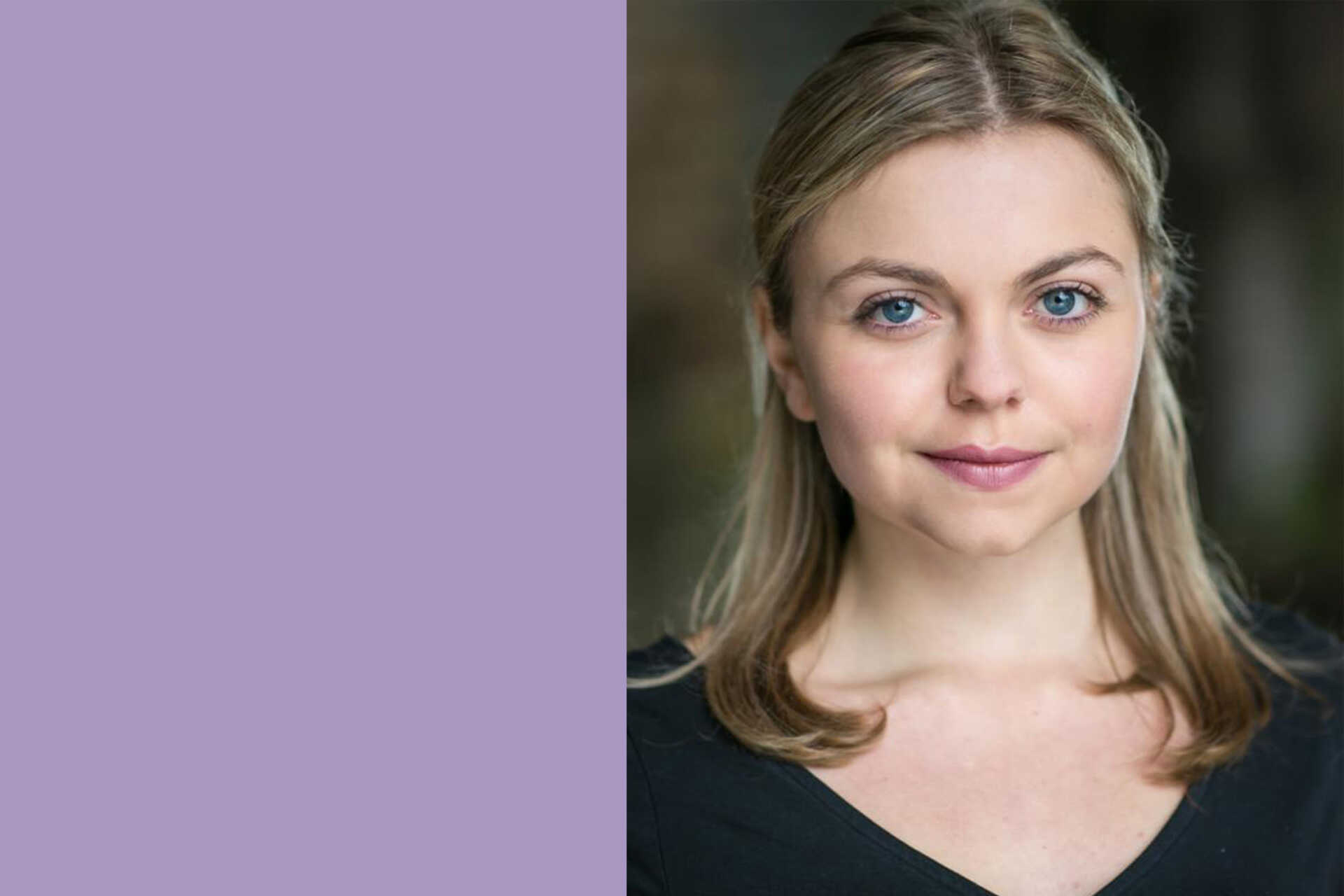
We work hard to maintain strong relationships with professionals and venues, helping to launch your career in the creative and cultural industries. You’ll be taught by leading actors, comedians and film makers with first-hand experience of what it takes to carve out a successful career in the industry. Their continued involvement in the industry will help you as you start to build your own network.
Our graduates have developed careers as: journalists, authors, literary managers, directors, performers, scriptwriters for television, stand-up comedians, casting agents, event managers, arts administrators, community theatre officers for local councils, and drama teachers.
Some recent graduate success stories include:
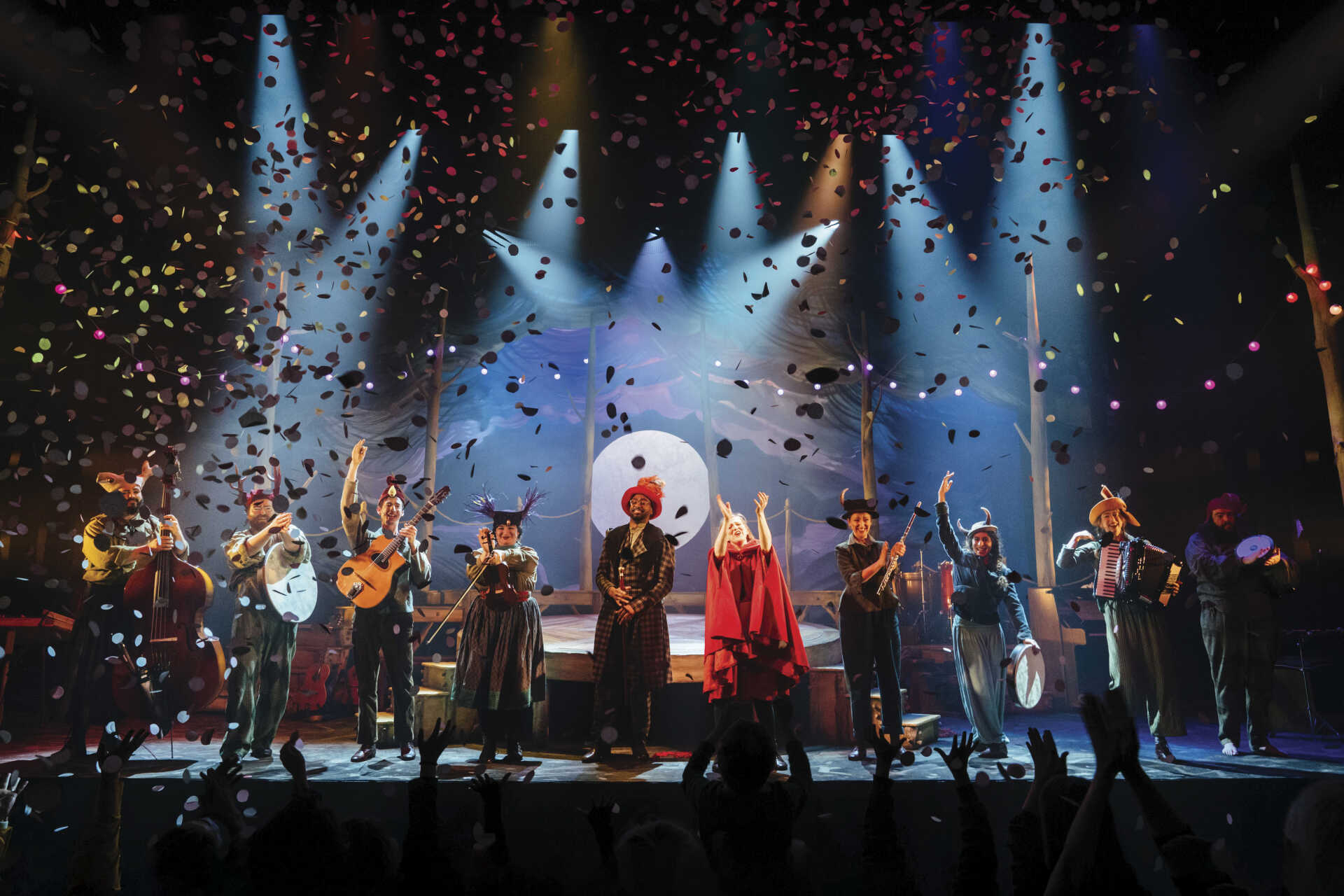
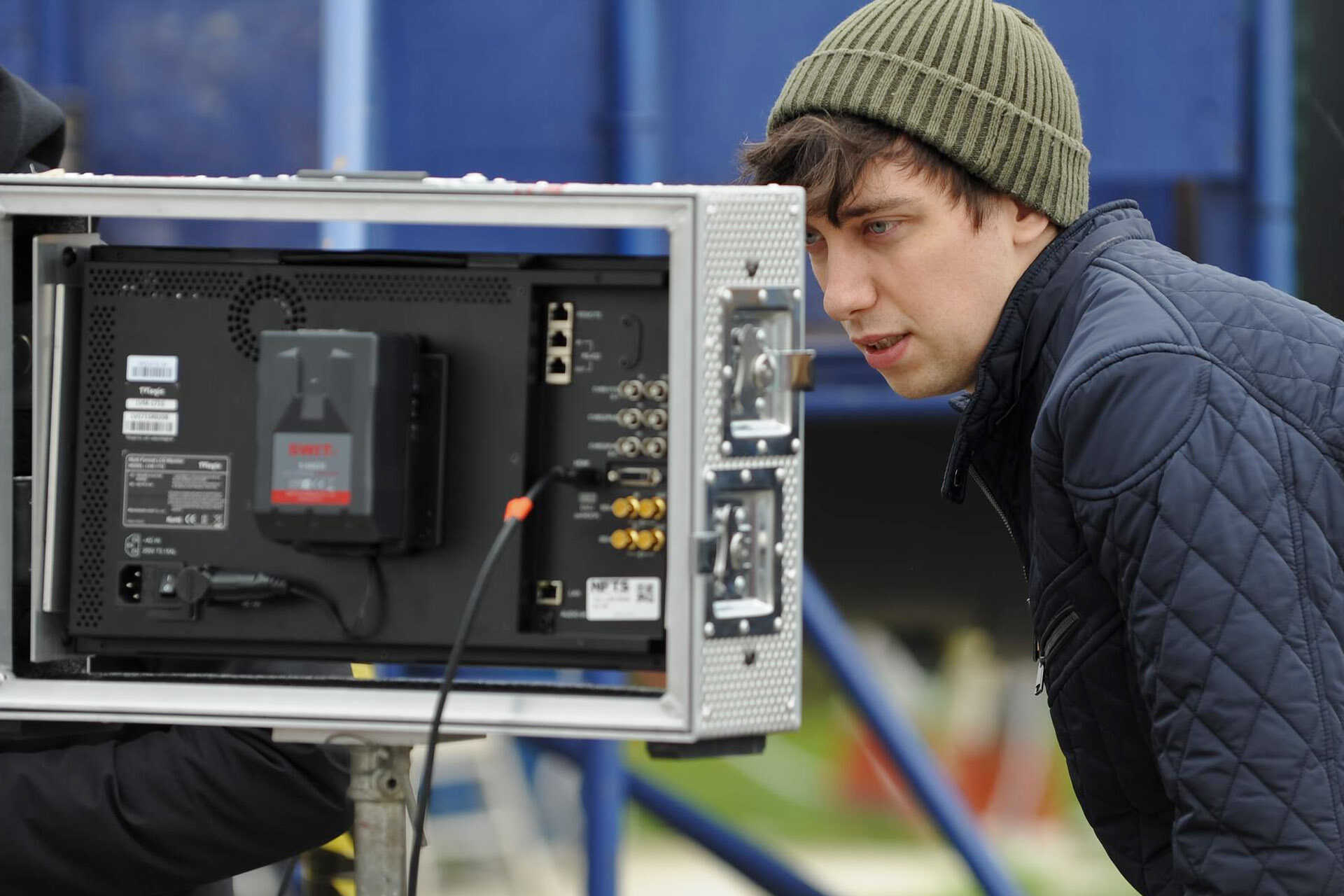
*The Government announced on 4 November 2024 that tuition fees in England for Home students will increase to £9,535 from £9,250 for the academic year 2025/26. This increase requires Parliamentary approval, which is expected to be given in early/mid 2025.
Tuition fees may be increased in the second and subsequent years of your course. Detailed information on possible future increases in tuition fees is contained in the Tuition Fees Increase Policy.
The University will assess your fee status as part of the application process. If you are uncertain about your fee status you may wish to seek advice from UKCISA before applying.
For details of when and how to pay fees and charges, please see our Student Finance Guide.
Fees for undergraduate students are £1,900.
Fees for undergraduate students are £1,430.
Students studying abroad for less than one academic year will pay full fees according to their fee status.
Students will require regular access to a desktop computer/laptop with an internet connection to use the University of Kent’s online resources and systems. Please see information about the minimum computer requirements for study.
Find out more about accommodation and living costs, plus general additional costs that you may pay when studying at Kent.
Kent offers generous financial support schemes to assist eligible undergraduate students during their studies. See our funding page for more details.
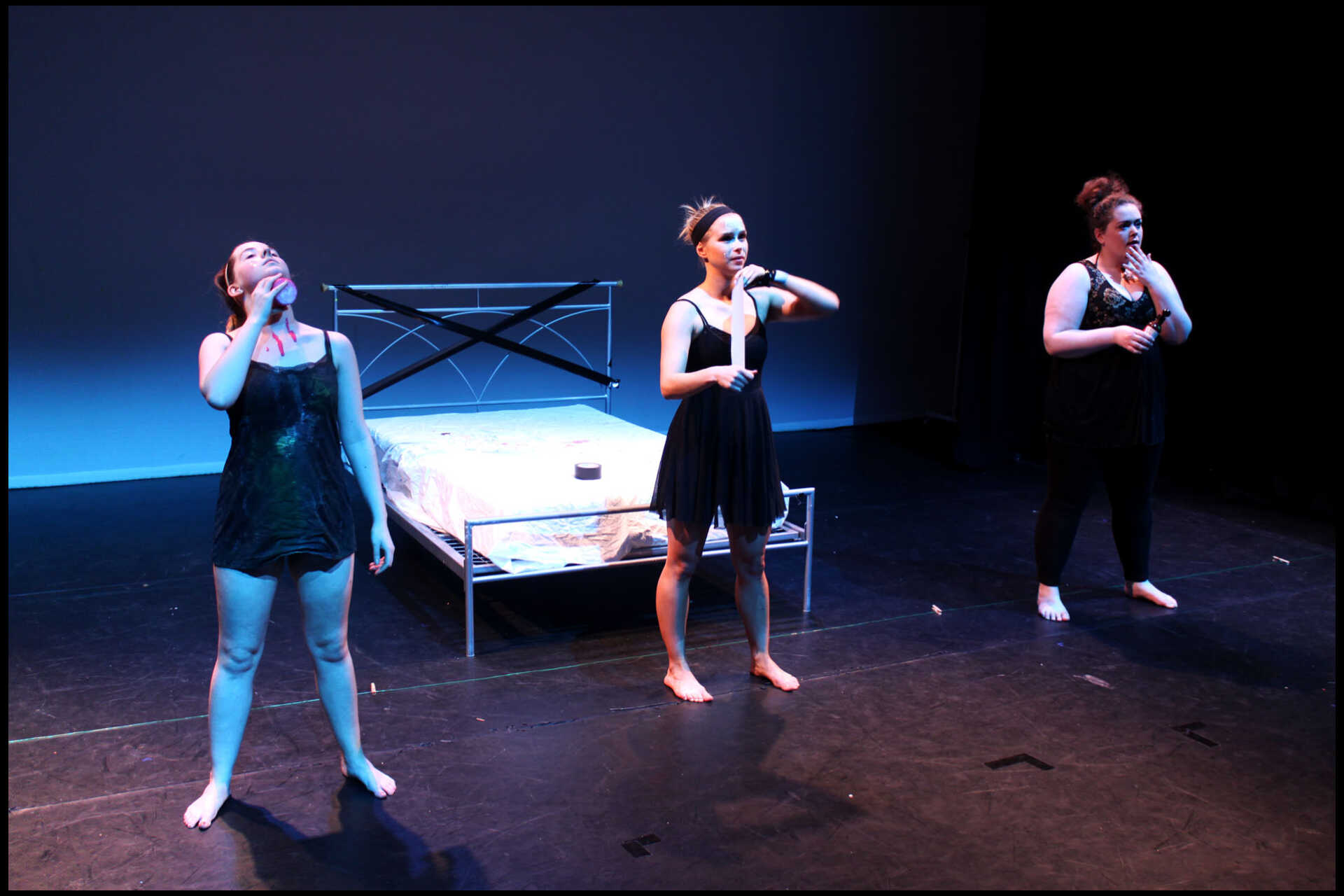
We have a range of subject-specific awards and scholarships for academic, sporting and musical achievement.
We welcome applications from students all around the world with a wide range of international qualifications.
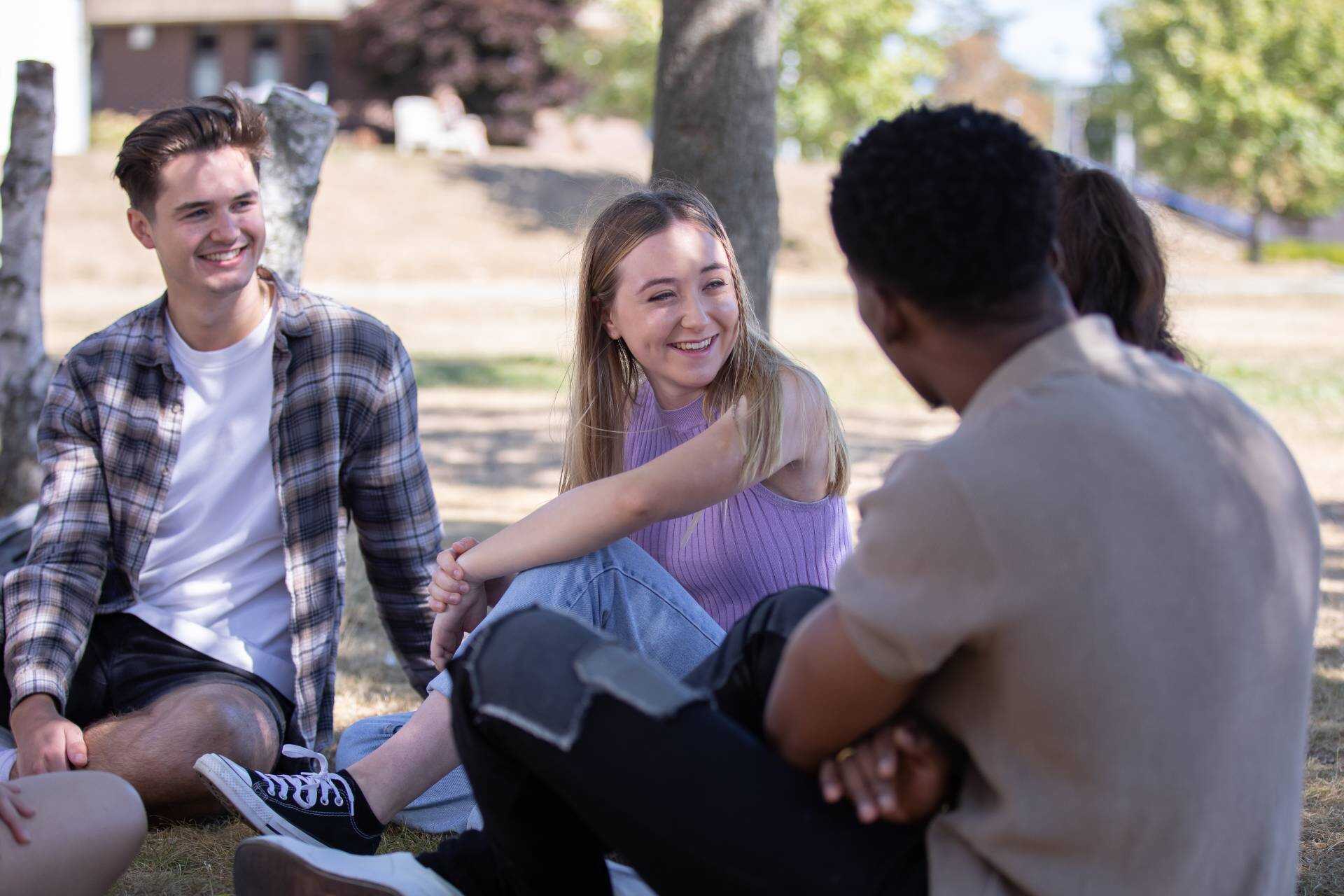
Student Life

Powered by progress
Kent has climbed 12 places to reach the top 40 in The Times Good University Guide 2025.
Kent Sport
Kent has risen 11 places in THE’s REF 2021 ranking, confirming us as a leading research university.

An unmissable part of your student experience.